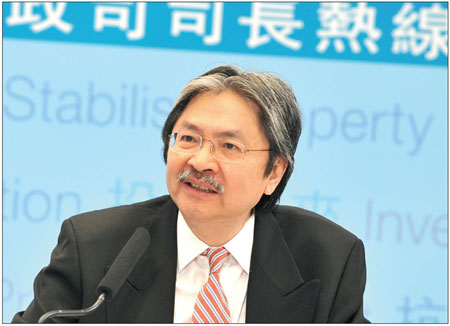Budget criticized over lack of rebate for taxpayers
Updated: 2011-02-25 07:50
By Joseph Li(HK Edition)
|
|||||||||
|
Financial Secretary John Tsang speaks at a joint radio phone-in program on the 2011-12 budget Thursday. Gis Photo |
Financial secretary sticks to his position paybacks to taxpayers would fuel inflation
Financial Secretary John Tsang defended his decision to forego any tax rebate in this financial year's budget and to put additional money into individual Mandatory Provident Fund (MPF) accounts.
He said adamantly that the budget was made with careful thought and he saw no need to change or refine it.
Tsang spoke on a live phone-in radio show and answered questions about his Wednesday budget speech at the Legislative Council Finance Committee.
During the radio program, callers were overwhelmingly critical of the government's failure to provide tax rebates despite recording HK$71.3 billion in fiscal surplus.
Middle-class callers grumbled that immediate relief from inflation through tax rebates would have been preferable to MPF injections, which will bring no benefit until they retire at age 65.
A civil servant called in to complain that, in the absence of tax rebate, he can hardly benefit from the concessions because he is under pension and not entitled to the MPF injections.
Callers suggested the government allow people to withdraw the HK$6,000 from the MPF accounts or divide the sum into two parts, with half for MPF and half for a cash rebate.
But Tsang rejected the suggestions arguing he will not do anything to aggravate inflation.
Tsang got another bumpy ride later at the subsequent Finance Committee meeting when most lawmakers continued to zero in on the tax rebate and MPF issues.
Accounting constituency lawmaker Paul Chan urged Tsang to reconsider the tax rebate and MPF injections.
Chan suggested the financial secretary leave out big earners paying the standard tax rates because they do not need the benefits.
"The middle class have the legitimate expectation of tax rebates to fight inflation when the government has recorded a huge surplus," he said.
Starry Lee, of the Democratic Alliance for Betterment and Progress of Hong Kong, noted that domestic consumption is not a cause of inflation in Hong Kong.
Democratic Party Chairman Albert Ho said Tsang should at least increase the salaries tax allowance in line with inflation since the allowance was last adjusted in the 2008-09 financial year.
Civic Party lawmaker Alan Leong reiterated the plea that the government resume construction of housing units under the subsidized Home Ownership Scheme to help people tackle the escalating housing prices.
His party colleague Audrey Eu complained about the lack of firm effort to improve air quality, which she noted is a cause for concern among local people and foreign investors.
Accordingly, she suggested a HK$6 billion fund to help bus companies to buy environment-friendly buses.
Jeffrey Lam, from Economic Synergy, said as this is Tsang's last budget that covers a full financial year, he hopes Tsang will help honor Chief Executive Donald Tsang's election pledge of lowering the standard profits and salaries tax rates to 15 percent within the remaining term.
Regarding the iBonds, he said foreign countries offer higher interest rates than inflation to attract buyers.
He also said many in the middle class and small and medium-sized enterprises prefer renminbi bonds because they buy goods with the yuan.
Tsang replied that the purpose of the MPF injections is to help people save money and invest in the future.
Since inflation is getting worse, he said, this is not the right time to cut taxes.
China Daily
(HK Edition 02/25/2011 page1)
